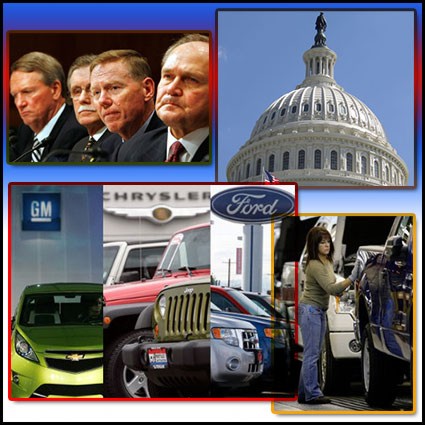Memo from Senate to UAW: The party’s over.
The so-called auto bailout bill, a $14 billion bridge loan intended to give automakers sufficient cash to continue operating in the first quarter of 2009, failed last night in the Senate. As far as getting government cash into the hands of the automakers this year, it’s over. Not gonna happen.
That is a very big problem for GM and Chrysler. Less so for Ford except for the fact that if GM in particular fails, it will so dramatically affect the suppliers that all of the automakers have in common that it could disrupt Ford’s operations sufficiently to drain all of their remaining cash.
The automakers are in big trouble and that is potentially big trouble for all of us.
According to what I have heard and read this morning, it came down to the intractability of the United Auto Workers, the union that represents the employees of the Big Three automakers.
What a surprise.
As you consider the plight of the automakers and nurse your media-driven irritation at the huge salaries of the CEOs and their travel to and fro on Gulfstream jets, be fair in your analysis and take a moment to consider these facts.
Fact number one. While it is true that the U.S. automakers built some really crummy cars in the 1970s and 1980s and thus allowed Toyota and Honda and BMW and others to establish a foothold in the U.S. market by offering a superior product, it is also true that the Big Three learned their lesson. U.S.-built cars are now among the best in the world. The quality advantage that the Japanese and German automakers once enjoyed is now largely gone. Their only remaining advantage lies in their manufacturing costs.
Fact number two. Ford and GM build and sell cars in Europe. The cars that they build are not all that different from the cars they build here. The workers who build the cars are no different than the workers who build cars in Detroit. The people they sell the cars to are no different from you and me and everyone in the U.S. that has ever bought a car. Ford and GM sell those cars in a market where gasoline routinely costs two to three times as much per gallon as we pay here.
And yet, Ford and GM make money selling cars that they manufacture in Europe. They lose money making and selling cars in America. Were it not for their European operations, GM and Ford would have been in the trouble they’re in now years ago.
Fact number three. The U.S. automakers know how to assemble cars better and more cheaply than they are able to in Michigan. Ford has an assembly plant in Camacari, Brazil that is the most technologically advanced auto assembly plant in the world. Where a human being is needed to perform a task, a human being is used. But where a task can be automated, it’s automated. No onerous union work rules that reduce productivity through featherbedding. Where it takes weeks to retool an assembly line to make a different model in a U.S. plant, they can do it almost overnight in Brazil. You can watch a video produced by the Detroit News on Ford’s Camacari plant here.
These three facts share a common thread. With respect to the German and Japanese manufacturers, the U.S. automakers are at a labor cost disadvantage. With respect to the European operations of Ford and GM, same story. Their labor costs in Europe are lower than in the U.S. and thus they make money in Europe while they lose money here. With respect to assembly plants, all three of the automakers would love to have Camacari-style plants in the U.S. But the contracts they have with the UAW won’t let them.
Guess what guys. The Senate of the United States just gave you hard notice that the party is over. If you folks don’t make major wage, benefit and work rule concessions, concessions that bring your wages and benefits in line with world market prices for what you do, it’s over. The taxpayers aren’t going to save you.
We need a healthy auto industry. The automakers have shown that they can build a car that the market will buy and do so profitably.
So the failure of the so-called bailout bill last night is the wakeup call to the unions. One way or the other, your deal is coming to an end.
It’s time to recognize that fact and get busy saving the industry you say you love and from which you feed your families.









Boooooooooooooooooooy, Those AIG Corp Execs really burn my “B***” accepting those Bonuses. While it is a small annual amount that I pay each year, $1997.00, I renew my plane insurance coverage with AIG and it probably does not make even a small noticeable dimple in the large pot of green backs that the company use to take in. However, if those Execs want to hide behind an employment contract and take those big bonuses while the US struggles to remain afloat, then I will definately see about changing my coverage to another carrier and that also includes trying to influence my other flying buddies in the EAA, AOPA and local flying groups to do the same. What a yellow streak they have down their backside if they can not say ……… NO !! I won’t take it. I want to help ! If AIG does not have the money then they sure can’t pay the bonuses. Let them sink !!!